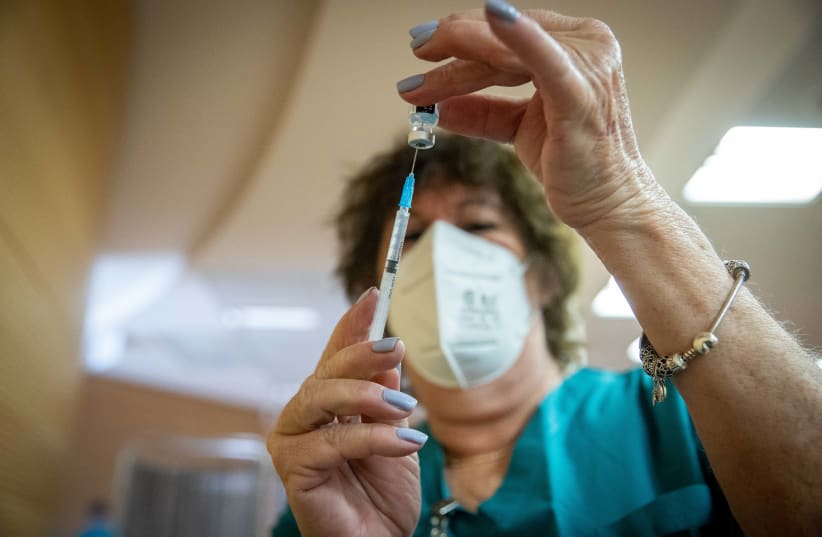Vaccination likely prevented coronavirus infection among more than 500 Hadassah-University Medical Center employees during the third wave of COVID-19 in Israel, according to a new study published by the hospital in The New England Journal of Medicine.
It also kept hundreds more out of isolation, allowing the hospital to operate at full capacity.
“I think we saved hundreds of medical workers from illness and hundreds more from isolation,” said Dr. Shmuel Benenson, head of Hadassah’s Infection Prevention and Control Unit, who was the lead researcher on the study.
The study, which was published in a letter to the editor in the journal, examined the morbidity rate from COVID-19 among vaccinated workers for eight weeks, based on the number of weeks that had elapsed since receiving the first vaccine dose, a release explained.
Vaccination began at Hadassah on December 20.
A decrease in morbidity among healthcare workers was already observed within two weeks after receiving their first shot. In the third week there was even more of a decline, which reached a low five or six weeks after the first inoculation.
The rate of infection declined to one out of 1,000 workers per week at the time, compared to a rate of 10 to 20 people infected per 1,000 among unvaccinated workers or Jerusalem residents.
Jerusalem’s rate of infection was among the highest in the country throughout the pandemic. In Hadassah, around 10% of its close to 7,000 staff members caught the virus at one point or another before vaccination – most in the community and not at work. But, as Benenson explained to The Jerusalem Post, each time a staff member caught coronavirus and came to the hospital before he or she was diagnosed, a full epidemiological investigation had to be carried out.
“We had to find out, who did he meet with at the hospital? Did the meeting put other staff members at risk? Were they wearing masks?” he said. “Because of these positive workers, we had to send many other workers into isolation.”
The reduction of so many staff members – as many as 150 sick and another 200 in isolation during peak periods – burdened the hospital and made it difficult to provide treatment at the height of the pandemic.
Benenson said that there are currently only about two staff members with the virus and another 10 in isolation.
Healthcare workers received priority vaccination from the outset of Israel’s vaccination campaign. This study confirms that decision and, Benenson said, can be used to support such efforts in other countries that are at an earlier stage in their own vaccination efforts.
“The effectiveness of the vaccines enabled optimal medical services at Hadassah’s hospitals for the residents in Jerusalem and beyond,” Benenson told the Post.
He said that while there have already been many real-world reports on the effectiveness of vaccination, this new study is unique in that it serves as a model for how vaccination can keep a hospital open and operating even when there is mass infection outside its walls.
“As soon as the staff was vaccinated, we basically shut down infection among them and could operate the best way possible,” Benenson concluded.
